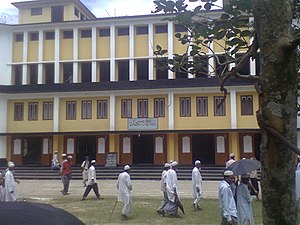Darul Uloom Banskandi
دارالعلوم بانسکنڈی | |
 The mosque of Darul Uloom Banskandi in 2013 | |
Other name | Banskandi Madrasa |
|---|---|
| Type | Darul uloom |
| Established | 1897 |
| Founders | Hafiz Akbar Ali, disciple of Imdadullah Muhajir Makki |
Religious affiliation | Islam |
| Principal | Muhammad Yahya |
| Students | c. 1200 |
| Address | 24°29′01″N 92°32′43″E / 24.4836°N 92.5454°E |
| Campus | 9 acres (3.6 ha) |
Darul Uloom Banskandi (Urdu: دار العلوم بانسکنڈی) is an Islamic seminary located in the Cachar district of Assam. It is the largest Islamic university in North-East India and extremely follows the methodology of Darul Uloom Deoband.[2][3]
History
[edit]The institution was founded by Hafiz Akbar Ali, who was a Manipuri Muslim and a disciple of Imdadullah Muhajir Makki.[4] He spent three years with him in Makka after taking the oath of allegiance (bay'ah) at his holy hand. One day, Makki instructed him to return to his homeland and to involve himself in Islamic education by establishing a madrassa institution. He then returned to Banskandi and founded the Banskandi Madrasa in 1897. His main co-operator was Nena Miyan, who gifted his land to the institution.[5]
Later, Hussain Ahmed Madani wished to make Banskandi Madrasa a second Darul Uloom in India and a center of Islamic education. So he appointed Ahmad Ali Badarpuri to the post of Shaykhul Hadith. He spent there the last two Ramadans of his life and inaugurated the Prophetic Tradition (Hadith) in 1957. He also predicted that the rising light of education from the Banskandi madrasa would shine on the world very soon. The basic condition of the madrassa was very poor. It had only a small mosque and three cottages. But under the patronage of Ahmad Ali Badarpuri, the institution turned into an Islamic university within a very short period of time.[6][7][8]
Contributions
[edit]The Deobandi scholars and their madrassas played a prominent and sterling role in the freedom struggle. They aimed at expelling the British and advocated for a united country in opposition to the partition of India. Banskandi Madrassa is not an exception to this.[9]
Darul Uloom Banskandi has produced many great Islamic scholars, Hafizs, writers, leaders, intellectuals, and social reformers.[10]
Darul Uloom Banskandi is called the "Shantiniketan" (abode of peace) of Northeast India.[11]
Reputation and Academics
[edit]Modeled after the prestigious Darul Uloom Deoband, this institution, with a large number of faculty, provides quality education to thousands of students every year. It has gained widespread reputation through Ahmad Ali Badarpuri. Ulamas produced from here render services in different places, including Deoband, in addition to the North-Eastern Region.[12]
The seminary offers the following courses:[13]
- Tajwīd and Qira'at
- Hifz (Memorization of the Quran)
- Aālimiyyat ('Alim course)
- Ifta (Mufti course)
- Daura-e Tafsir (Explanation of Quran)
- Takmīl-e-Adab (Arabic literature)
- A short 'ālim course
- Jild Sāzi (bookbinding)
Administration
[edit]Since the beginning of the institution, a number of Ulamas, such as Haji Miyadhan, Khalilur Rahman, Tayyib Ahmad Qasmi, and others, have served as its head and principal. Ahmad Ali Badarpuri was just like the director general of the institution, although he formally never held the post of principal. He controlled all sides remaining in the rank of Shaykh al-Hadith. He was the maker and the main patron of the seminary. Qari Muhammad Tayyib, the former vice chancellor of Darul Uloom Deoband, has called him the second founder of Darul Uloom Banskandi.[14][15]
Muhammad Yahya is the current principal of the institution.[16][17][18][19]
Notable alumni
[edit]- Abdur Rashid (Lanka), General Secretary of Assam state Jamiat Ulama e Hind (A)
- Abdul Haque, Hadith professor of Jamia Jalalia, Hojai
- Muzammil Ali Assami, Rector of Jamiatush Shaikh Hussain Ahmad Al-Madani, Khanqah, Deoband
- Hafiz Alauddin, former vice principal of the institution
- Ibrahim Khalil, Shaykh al-Hadith of Buraburi Madrasa, Morigaon
- Muhammad Yahya, current principal, and Shaykh al-Hadith of the institution
- Abdul Qadir, General Secretary, Asam State Jamiat Ulama e Hind (M)
References
[edit]Citations
[edit]- ^ Karmakar, Rahul (9 June 2018). "Assam Islamic seminary tightens admission rules". The Hindu. Retrieved 2 September 2023.
- ^ Bahn, Divya (2018-06-09). "In Assam madrasa, students have to prove kin settled before 1971". The New Indian Express. Retrieved 2024-03-23.
- ^ Nag, Sajal (2023-07-17). The Mughals and the North-East: Encounter and Assimilation in Medieval India. Taylor & Francis. ISBN 978-1-000-90525-0.
- ^ Barbhuiya, Atiqur Rahman (2020). Indigenous People of Barak Valley. India, Singapore, Malaysia: Notion Press. ISBN 978-1-64678-800-2.
- ^ Ahmad 2000, pp. 1–2.
- ^ Badarpuri 1992, pp. 21–23.
- ^ Qasmi 2010, p. 20.
- ^ Ahmad 2000, p. 2.
- ^ Ahmad 2000, pp. 10–11.
- ^ Ahmad 2000, p. 6.
- ^ "Assam revives awards in the name of historic Muslim personalities". Retrieved 1 September 2023.
- ^ Ahmad 2000, p. 5.
- ^ Qasmi, Javed Ashraf (2000). Faizan e Darul Uloom Deoband (in Urdu) (1st ed.). Ghasera, Mewat district, Haryana: Department of publication, Madrasah Ubay bin Ka'b Tahfeez al-Quran al-Kareem. p. 35.
- ^ Ahmad 2000, pp. 2, 6–8.
- ^ Qasmi 2010, pp. 19–20.
- ^ "Darul Uloom and Dastarbandi function held at Banskandi". The Sentinel. 11 May 2017. Retrieved 2 September 2023.
- ^ "Markazul Maarif Mumbai Holds its 18th Convocation". deoband.net. 7 April 2013. Archived from the original on 7 July 2023. Retrieved 1 September 2023.
- ^ Anand, Manoj (2018-06-16). "Assam: Madrasa bans admission sans legacy papers". Asian Age. Retrieved 2024-09-17.
- ^ Mitra, Naresh (9 June 2018). "Assam madrassa makes legacy papers a must for admission". The Times of India. Retrieved 1 September 2023.
Bibliography
[edit]- Ahmad, Tayyib (2000). Darul Uloom Banskandi (in Bengali). Banskandi, Cachar district, Assam: Darul Uloom Banskandi.
- Badarpuri, Ahmed Ali (1992). Salasil-e-Tayyibah (in Bengali). Hojai, Assam: Mufassil Ali.
- Qasmi, Abdul Quadir (January 2010). Sheikh Moulana Ahmed Ali, Jeevan Aru Karma [The Life and Works of Shaikh Maulana Ahmed Ali] (in Assamese). Hojai, Assam: Mufassil Ali.
